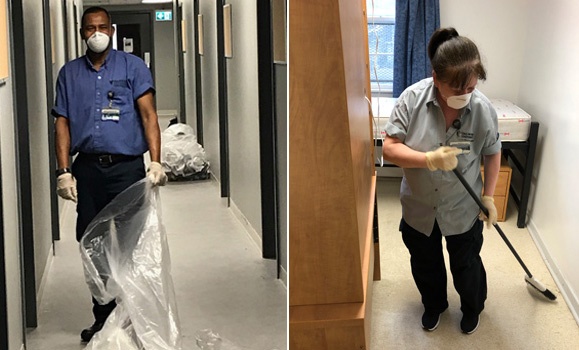At a time when many Dal employees are working from the safety of their own homes, dozens of custodians continue to make the trek to campus each day to keep those few corners of the university still operating in person as safe and clean as possible.
They are there for those students in residence who have nowhere else to go. They are there for the researchers battling COVID-19. And they are there for all those other staff members — the security officers, the thermal plant operators, the clinicians — showing a similar commitment on campus each day.
“They are out there, doing it,” says Mike Campbell, manager of custodial services at Dal. “They are emblematic of a commitment to service and should be recognized for that.”
The arrival of COVID-19 in Canada earlier this year and subsequent outbreaks of the virus across Nova Scotia and in Halifax in recent weeks have transformed some of Dal’s custodial teams into an essential service in rapid fashion and hammered home the critical importance of the work they do day in and day out.
As Campbell puts it, “We’re beyond the idea of cleanliness now. We’re in infection control.”
Heightened standards, essential services
Darrell Boutilier, director of operations for Facilities Management at Dal, says custodial teams began stepping up their cleaning practices in early March even before Halifax was really hit by the virus.
Standards once reserved for spaces such as labs and clinics were soon applied across more common areas and eventually the entire campus, with high-traffic areas and surfaces targeted more frequently and supplies replenished more often.
When the university made the decision in March to reduce on-campus staff to those working in essential services as a safety precaution, custodial staff on campus daily dropped from 190 to about 40 — many focused on residences.
“We’ve been fortunate that there seems to be a real loyalty there between the students and the custodians that work in residence,” says Boutilier. “I think they take great pride in having that direct influence with the students.”
That’s how Sue Strowbridge, a general foreperson to custodial teams in residence and 35-year Dal employee, sees it.
“We’re family here. Everybody loves the students,” she says. “Everyone looks forward to making sure everything is good for anybody coming in and out.”
Adapting to new realities
That doesn’t mean there haven’t been challenges with all the change lately.
While there are fewer custodians on campus overall, those who do show up have had to do so in a strange new environment. Personal protective equipment such as masks and gloves are now required and available at all times and cleaning schedules are being better designed to allow for social distancing.
Strowbridge, right, says she makes sure to check in on her employees regularly — usually with a phone call or text — to ensure that they are not feeling too isolated.
Despite the added challenges and risks of custodial work right now, Campbell says more than 20 of his staff have volunteered to come in to fill any gaps even though they are not working in areas deemed essential.
“The thing is they volunteered, and that’s something considering the circumstances,” he says.
Even Campbell and some of his supervisors have stepped in to help out when needed, cleaning alongside custodians to help keep the university running.
“It’s all-hands on deck and do whatever you have to do to make sure the students and others are looked after,” says Boutilier, lauding Campbell and the others for their extra efforts. “People have gone way beyond their normal duties the last few weeks to make sure that things are getting serviced and everyone is safe and healthy.”

